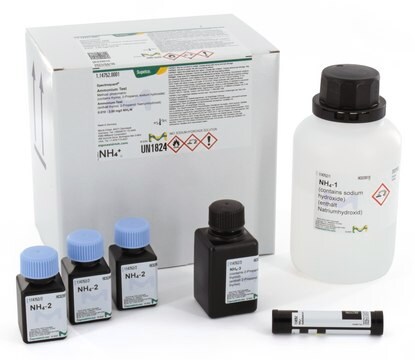Alle Fotos(1)
Wichtige Dokumente
MAK538
Ammonia Assay Kit
sufficient for 100 colorimetric or fluorometric tests
Anmeldenzur Ansicht organisationsspezifischer und vertraglich vereinbarter Preise
Alle Fotos(1)
About This Item
UNSPSC-Code:
12161503
NACRES:
NA.84
Empfohlene Produkte
Qualitätsniveau
Nachweisverfahren
colorimetric
fluorometric
Relevante Krankheit(en)
gastrointestinal diseases
Versandbedingung
wet ice
Lagertemp.
−20°C
Verwandte Kategorien
Allgemeine Beschreibung
Ammonia (NH3) or its ion form ammonium (NH4 +) is an important source of nitrogen for living systems. It is synthesized through amino acid metabolism and is toxic when present at high concentrations. In the liver, ammonia is converted to urea through the urea cycle. Elevated levels of ammonia in the blood (hyperammonemia) have been found in liver dysfunction (cirrhosis), while hypoammonemia has been associated with defects in the urea cycle enzymes (e.g. ornithine transcarbamylase).
Leistungsmerkmale und Vorteile
- Linear detection range: 24 to 1000 µM
Eignung
The kit is suitable for ammonia determination in biological samples (e.g. serum, plasma, urine, saliva, cell culture, etc).
Prinzip
The Ammonia Assay Kit is designed to directly measure NH3 and NH4 +. In this assay, NADH is converted to NAD+ in the presence of NH3, ketoglutarate and glutamate dehydrogenase. The decrease in optical density at 340 nm or fluorescence intensity at λEx = 360 nm/λEm = 450 nm is directly proportionate to the NH3 concentration in the sample.
Lagerklassenschlüssel
10 - Combustible liquids
WGK
WGK 3
Hier finden Sie alle aktuellen Versionen:
Analysenzertifikate (COA)
Lot/Batch Number
It looks like we've run into a problem, but you can still download Certificates of Analysis from our Dokumente section.
Wenn Sie Hilfe benötigen, wenden Sie sich bitte an Kundensupport
Besitzen Sie dieses Produkt bereits?
In der Dokumentenbibliothek finden Sie die Dokumentation zu den Produkten, die Sie kürzlich erworben haben.
Unser Team von Wissenschaftlern verfügt über Erfahrung in allen Forschungsbereichen einschließlich Life Science, Materialwissenschaften, chemischer Synthese, Chromatographie, Analytik und vielen mehr..
Setzen Sie sich mit dem technischen Dienst in Verbindung.



